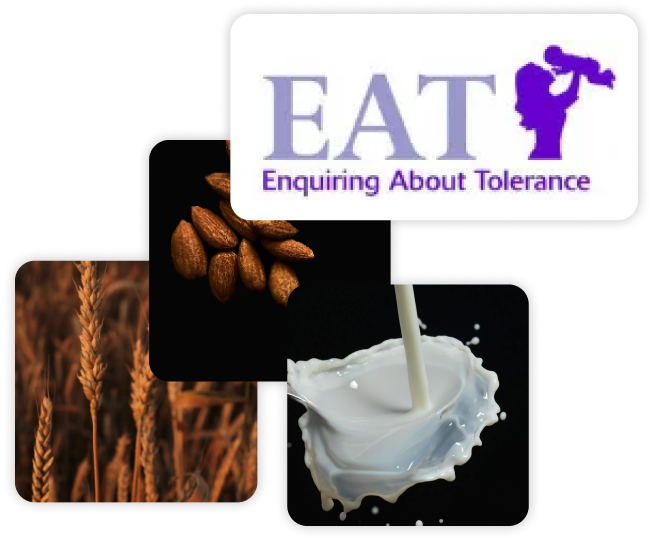Frequency of guideline-defined cow's milk allergy symptoms in infants: Secondary analysis of EAT trial data.
January 2022
Read paper: Frequency of guideline-defined cow's milk allergy symptoms in infants: Secondary analysis of EAT trial data.

The Enquiring About Tolerance (EAT) study aimed to investigate whether the early introduction of six allergenic foods (milk, peanut, sesame, fish, egg, and wheat), alongside continued breastfeeding, reduced the number of children developing food allergies and other allergic diseases, such as eczema, by the age of three.
The EAT Study showed that introducing allergenic foods (cow’s milk, egg, wheat, sesame, cod fish, and peanut) from three months of age alongside breastfeeding (vs exclusive breastfeeding for six months) reduces the risk of food allergy. The EAT cohort has also provided important data for observational analyses, for instance on the development of the gut and skin microbiome in early life, the link between pet exposure and food allergy and the positive link between moisturiser application and the risk of food allergy development. The latter finding was key to support the planning of the EU-funded TRANS-FOODS study.
January 2022
Read paper: Frequency of guideline-defined cow's milk allergy symptoms in infants: Secondary analysis of EAT trial data.March 2021
Read paper: Association of frequent moisturizer use in early infancy with the development of food allergy.November 2020
Read paper: Early Gluten Introduction and Celiac Disease in the EAT Study: A Prespecified Analysis of the EAT Randomized Clinical Trial.September 2020
Read paper: Bathing frequency is associated with skin barrier dysfunction and atopic dermatitis at three months of age.August 2020
Read paper: Longitudinal analysis of the effect of water hardness on atopic eczema: evidence for gene-environment interaction.December 2019
Read paper: Efficacy of the Enquiring About Tolerance (EAT) study among infants at high risk of developing food allergyDecember 2019
Read paper: Factors influencing adherence in a trial of early introduction of allergenic food.November 2019
Read paper: Dog ownership at three months of age is associated with protection against food allergy.May 2016
Read paper: Enquiring About Tolerance (EAT) study: Feasibility of an early allergenic food introduction regimenFebruary 2016
Read paper: Enquiring About Tolerance (EAT) study: Feasibility of an early allergenic food introduction regimen.December 2010
Read paper: Challenges experienced with early introduction and sustained consumption of allergenic foods in the Enquiring About Tolerance (EAT) study: A qualitative analysis.Kings College London
St George's London
Guy's and St Thomas' NHS Foundation Trust
Senior Clinical Research Fellow, King’s College London
We will update this website as we progress with the Enquiring About Tolerance study.